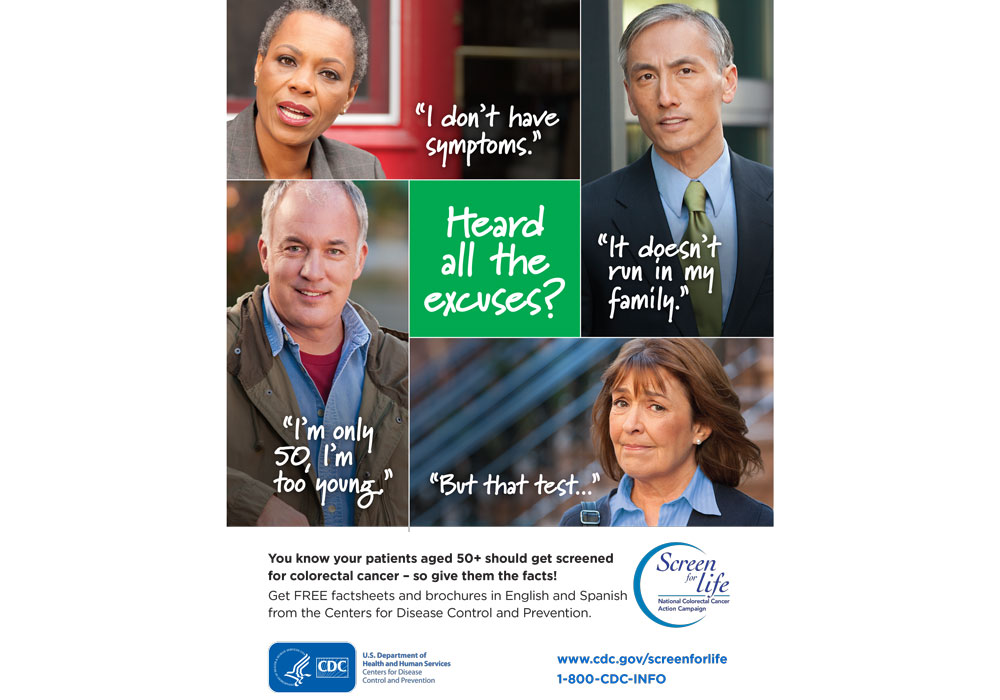By Cynthia A. Gelb, Director of CDC’s Screen for Life Campaign
Of cancers affecting both men and women, colorectal cancer (CRC) is the second leading killer in the United States. In 2014, according to the Centers for Disease Control and Prevention, 139,992 people in the United States were diagnosed with CRC and 51,651 people died from it. Oncology nurses know that screening tests allow for healthcare providers to remove polyps before they become cancer or identify CRC in its earliest, most treatable stages. Clearly, screening is key to preventing CRC, most insurance plans cover screening, and patients now have more screening test options than ever. So why is CRC still so common? Why do people we know and care about still get this disease?
A Look Back
In a 1997 national CDC survey, only 41% of adults aged 50 and older reported being screened. That year, my own mother was diagnosed with and treated for stage II colon cancer. (She marked 20 years as a survivor last November.)
One year later, Medicare started covering CRC screening. And in 1999, CDC launched the Screen for Life: National Colorectal Cancer Action Campaign to raise awareness about the benefits of screening for CRC.
Progress, but More Work to Do
Today’s most recent studies show that nearly two-thirds of Americans aged 50–75 have been screened according to national recommendations. Although we’ve made progress, clearly more work must be done.
At CDC, we are committed to increasing screening for CRC. As head of CDC’s Screen for Life campaign, I am committed to doing everything I can to ensure more people get tested as recommended. We conduct studies to learn what people aged 50 and older know, think, and do about CRC screening. We routinely update and create new English and Spanish materials for providers to share with patients and for patients to read online or download and print. We offer fact sheets, brochures, posters, dioramas, and display and digital ads. You may have seen Screen for Life’s broadcast and print public service announcements featuring celebrities such as Morgan Freeman, Diane Keaton, Jimmy Smits, Meryl Streep, and Terrence Howard.
CDC’s Division of Cancer Prevention and Control provides support to state, tribal, and territorial health departments through its National Comprehensive Cancer Control Program (NCCCP) and Colorectal Cancer Control Program (CRCCP) to help increase screening.
NCCCP provides funding and technical advice to create, carry out, and evaluate CRC control plans and activities, focusing on prevention, detection, treatment, survivorship, and health disparities related to CRC and other cancers. NCCCP funds programs in 50 states, the District of Columbia, 6 U.S. Associated Pacific Islands and Puerto Rico, and 8 tribes or tribal organizations.
CRCCP funds 29 states, universities, and tribal organizations that partner with healthcare organizations to implement proven interventions to increase CRC screening. Grantees have worked with more than 200 health systems, reached more than 1,000,000 patients, and increased CRC screening rates by 4.4% in just one year.
As healthcare providers, you have tremendous influence and can help educate your patients and their families. CDC developed continuing education modules to help you stay up to date on screening recommendations. The modules provides guidance and tools on optimal ways to implement CRC screening to help ensure that patients receive maximum benefit.
Everyone Can Make a Difference
On a personal level, I regularly ask friends—and strangers!—who are aged 50 or older if they’ve been tested. I urge, cajole, and encourage. I tell them about screening test options. I tell them my mother’s survivor story. I share my own screening experiences.
So let me ask: if you knew about a cancer screening test that could save lives, wouldn’t you tell everyone about it? Of course you would!
Please help spread the word. March is National Colorectal Cancer Awareness Month. Each of us can make a difference in March and throughout the year.






